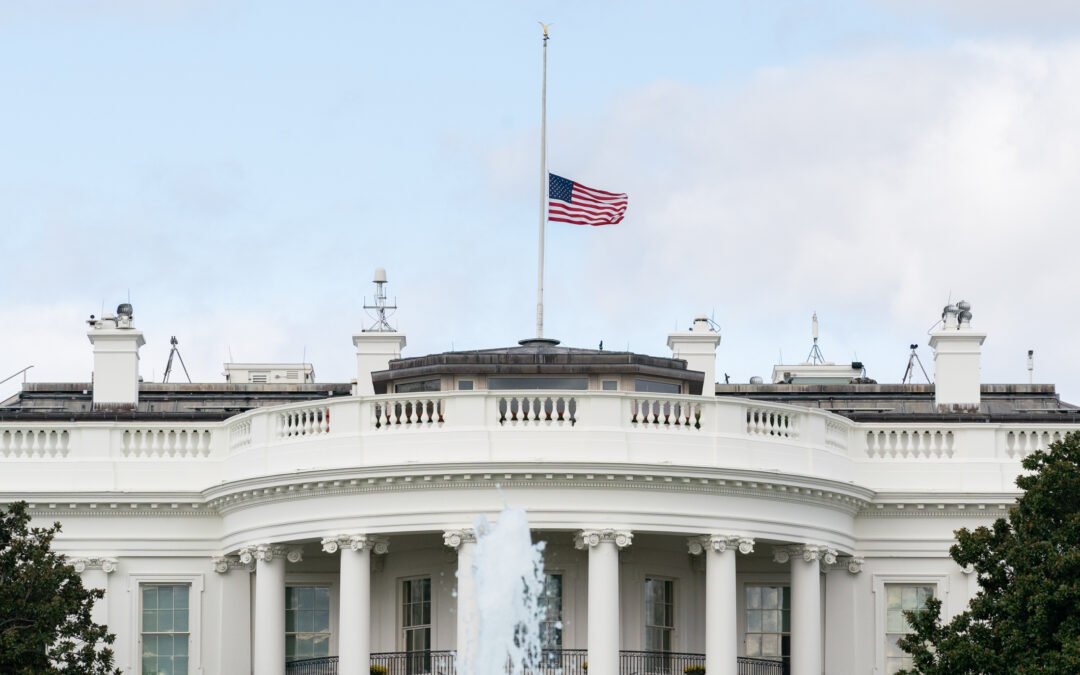(Based on characters in The Lightning in the Collied Night)
February 5, 2036, 3:27 p.m.
As Daniel Bennett stood to one side of the East Room of the White House, comforting and thanking Aida Pendamai’s close friends and family at her funeral reception, he noticed the Obamas talking with the Bushes about 20 feet away. He was about to walk over to thank Michelle for her moving tribute to Aida at the funeral service earlier that day when Aida’s close friend, Representative Kaleo Peleke from Hawai’i, approached him with outstretched hands. Peleke had served as one of Aida’s pallbearers, along with her two children and other family members and close friends.
“Daniel, I’m so sorry for your loss,” Peleke said with a somber, kind expression. They clasped hands and then embraced.
“Thank you, Kaleo. But, your loss, as well,” Daniel replied to his friend and protégé.
“Yes… and a great loss for the country—for the whole world. I’ll miss her.” Peleke paused, and then his face brightened a bit. “It was a beautiful service, wasn’t it? I think Aida would have liked how joyful it was. And, your eulogy was wonderful.”
“Yes, it was a beautiful service. And, thank you. I have to tell you, that was one of the hardest things I’ve ever done.” About as tough as Sahra’s funeral, Daniel thought sadly. Sahra had been Daniel’s fiancée, who’d died tragically in 1993 only two weeks after they’d become engaged.
“Saying farewell to loved ones is very hard,” Peleke agreed. “But, I don’t want to monopolize your time, Mr. President. And, I need to pay my respects to Aida’s extended family.” He grasped Daniel’s hands again. “Aloha, my friend. A hui hou.”
“Take care, Kaleo.” As Peleke headed to the other side of the huge room, Daniel was about to seek out Michelle Obama when two people approached him: NASA Director Mire Bashir Siad and Senator Irene Wilkes. Daniel had met Siad several times, but he didn’t know Wilkes very well. She had been elected to the Senate in 2034 and was on the subcommittee on Commerce, Justice, Science and Related Agencies; it managed NASA’s appropriations, among others. He also knew that she was a strong proponent of the American Security Act.
“Hello, Director, Senator. Thank you for coming,” Daniel greeted them warmly.
“Mr. President, my sincerest condolences,” Siad said quietly. Wilkes offered her condolences, also.
“Thank you both. Aida was a big fan of yours, Director. You know what she thought about NASA, and its mission.”
Siad smiled, “That is kind of you to say, Mr. President. I and everyone at NASA greatly appreciated President Pendamai’s support. She once told me that our exploration of space is vital to humanity’s future. Not everyone understands that, I’m sorry to say.”
“Well, the president was an exceptional person, in many ways,” Daniel replied with a faint smile. Siad and Wilkes nodded in agreement. Then Daniel saw a very familiar face standing behind Siad and looked at the man.
“Senator Kassenbaum, you know Director Siad, and of course Senator Wilkes.” Jim Kassenbaum was the senior senator from Kansas. Although he was from the other side of the aisle, he and Daniel had quickly become close friends when Daniel was in the Senate.
“Of course, Mr. President,” Kassenbaum replied as he took Daniel’s cue and joined the small group of people. Kassenbaum, Siad and Wilkes exchanged greetings.
“I just wanted to tell you, Mr. President, I thought your eulogy was perfect,” Kassenbaum told Daniel. “The appeal for the Toronto Climate Agreement was a nice touch.” Daniel noticed an almost imperceptible frown on Wilkes’ face, but she said nothing. Siad smiled and voiced his agreement with Kassenbaum’s remarks.
“Mr. President,” Wilkes said in a flat tone, “I apologize, but I have a committee meeting soon. Again, my condolences to you.” She turned to Siad and Kassenbaum, “Director, Senator.” Then she headed for the exit.
Kassenbaum leaned toward Daniel and whispered, “Was it something I said?” Daniel smiled inwardly at his friend’s dry humor.
“Mr. President, Senator—if you will please excuse me, I must return to my office for a progress update on the Tyson telescope,” Siad said. Daniel and Kassenbaum said goodbye to the NASA director, and he followed Wilkes toward the exit of the East Room.
“Okay, you can cut the ‘Mr. President’ stuff now, Jim,” Daniel said with a wink. “And about the plea for the Toronto Agreement… that was Aida’s idea.” His face turned somber. “But I don’t think it’ll be enough… we just don’t have the votes.”
Kassenbaum frowned. “That’s bad news, Daniel. As you well know, it could be our last, best hope to curb the effects of climate change. Isn’t there anything you can do?”
Daniel looked at the floor for a moment, then looked up at Kassenbaum. “I’ve tried everything I can think of. But… there is one possibility. I’ve been approached by the sponsors of the American Security Act. They’ve offered me a deal: the Toronto Agreement for the ASA.” The ASA’s proponents had touted it as a means to protect America, and Americans, from threats from China, Russia, and terrorist states and organizations. But Daniel, Jim Kassenbaum, and others were concerned that the sweeping legislation would run roughshod over the civil rights of many Americans. Both Daniel and Kassenbaum had spoken out forcefully about those risks—Daniel as vice president and Kassenbaum from the Senate floor.
“Daniel, you can’t be seriously considering that deal!” Kassenbaum exclaimed with alarm.
“I’ve been thinking about it,” Daniel replied softly. “I may not have a choice, if we can’t find more votes for the Toronto Agreement.”
“The ASA is an abomination against the Constitution, human decency, and God! God help us if it passes. And if it does… you must veto it, Daniel!”
Daniel looked at his friend. “I’ll do whatever I can, Jim.” I hope to God I’m not faced with making an impossible choice.
(Public Domain image courtesy of Wikimedia)
